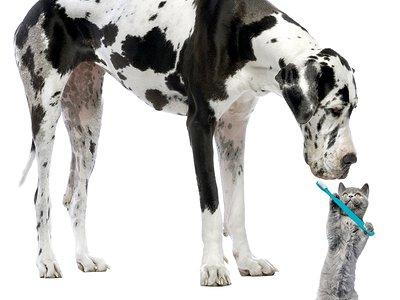
- posted: Feb. 05, 2018
February is Dental Month!
Did you know your pets’ dental health is a very important factor to their overall health? Dental health can cause, or be caused by, other underlying problems. Other areas of your pets’ health that can be affected by dental health include the liver and kidneys as well as the heart muscle.
Your pets’ teeth should be checked at least once a year by your veterinarian to ensure early signs of any issues can be caught.
If you observe any of the following signs, you should consider having your pets’ teeth checked:
o Bad breath
o Broken or loose teeth
o Extra teeth or retained baby teeth
o Teeth with discolouration or tartar buildup
o Abnormal chewing or drooling
o Reduced appetite or reluctance to eat
o Pain in or around the mouth
o Bleeding from the mouth
o Swelling in or around the mouth
A change in your pets’ behaviour can also be an indication of any dental issues. We highly recommend taking caution when examining your pets mouth as an animal in pain may react in a way you wouldn’t expect.
Oral health care and dentistry’s include; Cleaning, filling, adjustment, extractions, repair and polishing.
Once under anesthetic, the process will begin with an oral examination performed by your Veterinary Technician, where they will grade your pets’ dental health from a score of 0 (normal) to 4 (severe). The exam includes but is not limited to checking the pocket depth surrounding the teeth, severity of gingivitis, if there are any loose or painful teeth, bone loss etc. Radiographs may need to be taken to further asses the health of your pets’ teeth and gums. Radiographs are highly recommended because most dental disease starts below the gum line where it can not be seen. A thorough cleaning is then performed. This is done prior to any extractions minimizing the amount of bacteria that may enter the bloodstream. Once the cleaning is done, your veterinarian will extract any affected teeth. During the entire procedure, your pet will be under anesthesia and monitored by a veterinary technician.
An emphasis on anesthesia: some people may wonder if anesthesia is necessary to perform a dental cleaning procedure, the answer is yes. Animals do not understand what it is we are doing and quite often a cleaning would be painful for them without anesthesia as we need to clean up under the gum line. For the comfort of your pet we will always use anesthesia for our dental procedures.
A thorough dental cleaning will include scaling of the teeth to remove tartar and calculus buildup, followed by a polish of each individual tooth. Extractions will be done only if the veterinarian considers it necessary.
Problems that can occur in your pets’ oral health:
o Broken teeth or broken roots
o Severe periodontal disease
o Abscesses or infected teeth
o Cysts or tumors in the mouth
o Malocclusion or mis alignment of the teeth and bite
o Broken or fractured jaw
o Palate defects
Causes of Pet Dental Diseases:
Pets can start to develop dental problems at 3 years of age or even younger in some cases. If preventative measures are properly taken, dental diseases in your pet can be prevented. Early detection and treatment are critical in preserving your pets’ dental health.
What can I do to prevent dental disease in my pet?
Prevention is key and in pet oral health it’s not always the easiest task. Prevention of oral health problems in your pet may take some trial and error as well as patience. Every pet is different, therefore what works for one, may not work for another. A good start is daily brushing of your pets’ teeth. This would preferably be started when they are a puppy/kitten as this will get them more comfortable with it as they grow up. We understand that for some, we are a few (or many) years past that stage, however it’s never too late to start. Daily brushing is the number one way to prevent dental disease in your pet however, for some this may not be an option, in which case it is recommended that you discuss other commercial products with your veterinary team prior to use. Another key preventative measure is your pets diet. There are dental formula diets as well as treats/chews that can help prevent tartar buildup in your pets’ oral cavity. This is another topic that can be further discussed with your veterinary team as some pets can not be changed from their current/ strict diet.
If you have any questions regarding your pets’ oral health, or if you would like to set up a free dental consultation with one of our experienced Veterinary Technicians, please call us at 289-837-0100.
Written by,
Rachel, Veterinary Technician
Office Hours
8:00 AM - 8:00 PM
9:00 AM - 2:00 PM
Closed
Location
2319 Lakeshore Rd W.
Oakville, ON L6L 1H2, Canada


